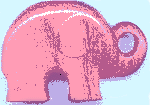 Back
to HomePage Back
to HomePage  Next Page Next Page  Back a Page Back a Page
  To remember properly, the brain must be working at full power,
so health is of paramount importance To remember properly, the brain must be working at full power,
so health is of paramount importance 
The brain comprises only about 2% of the total body
weight in an adult, but uses 20% of the body's total supply of oxygenated blood.
It needs nourishment 24 hours a day as it cannot store significant reserves. This is why
it is so important to have a good breakfast, to boost your brain power and memory after
the long overnight fast.
What nutrients are vital for the brain?
Iron is needed for cell multiplication and
growth. Any iron deficiency will impair learning and memory skills.
Sources of iron: Meat is the best source (liver, lean beef, chicken and
lamb), peas, broccoli, carrots, figs and raisins.
Proteins are needed to build new cells, to
make new hormones and enzymes and to manufacture new neurotransmitters.
Sources of proteins are meat, fish, peas, beans,
lentils, soya beans and soya bean products, eggs and dairy products.
Sodium and potassium are vital to brain
health and are found in a balanced diet including plenty of fruit and vegetables.
A balanced diet is high on complex carbohydrates such as bread, pasta and
potatoes and low in all types of sugar.
Fatty foods including fatty meat should be avoided as well as an excessive intake of dairy
products.
The best type of diet is rich in fibre with only a moderate alcohol intake.
Older people
Often signs of senility in older people are due to a poor diet lacking in essential
nutrients. When the diet is improved, the brain power can also improve.
Exercise
The supply of oxygenated blood which the brain uses to function is greatly increased when
a person does aerobic exercise, that is, exercise which raises the heartbeat.
Brisk walking, dancing, skipping, jogging, cycling (indoors or outdoors) are all
excelllent forms of exercise, and most people can do and enjoy one or other of
these.
For maximum benefit you must exercise for at least twenty minutes every other day, so it
is vital to choose a form of exercise which you enjoy and can sustain as a regular part of
your lifestyle.
Another great point in favour of aerobic exercise is that it stimulates the brain
to release endorphins which are natural hormones producing a feeling of happiness.
So Happiness is a brisk walk rather than a cup of coffee.
Breathing
Breathing is our most vital activity, but few of us really think about breathing
at all unless it becomes difficult.
It is probably a good idea to learn proper breathing from a Yoga expert, but basically it
is important to breathe deeply through the nose so that the breath goes right down into
the abdomen rather than staying in the upper part of the chest as in light shallow
breathing.
Stress
Stress has got a bad press, but is a basic part of the human condition and is not
necessarily a bad thing. We need to be keyed up to act appropriately in situations of
danger and challenge.
What is bad however is that modern life tends to give us a great many stressful situations
without the accompanying need to fight the assailant off or flee away from them at great
speed.
Our systems can easily become full of adrenalin which we cannot get rid of in the way our
body intended and so it remains in the system making us feel constantly keyed up and on
edge.
What may be a stressful situation to one person may not be viewed at all in the same way
by the next, so it is important for each of us to be able to review our own feelings and
act accordingly to reduce stress if necessary.
Ways of reducing stress
Relaxation techniques which involve alternately tensing and relaxing the
different groups of muscles work well, because when a muscle is strongly tensed and then
relaxed, it becomes more relaxed than it was before the contraction.
Massage of different types is always relaxing, whether foot massage, full
body massage or shiatsu.
Meditation can take many forms. The result being sought is greater
self-awareness and realisation of the unity of all things.
Pets - interacting with pets is relaxing as they are always friendly,
never judge or answer back, often have wonderful tactile fur to stroke and usually have
great empathy with human feelings.
Complementary Medicine
Gingko Biloba is widely used in the treatment of memory loss. It derives from the
Gingko tree which is a rare survivor from the Mesozoic era.
 Top of Page Top of Page 
 Back to HomePage Back to HomePage 
|